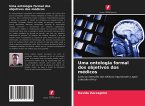Computable representations of medical knowledge are crucial if a computer is to intelligently help a physician caring for his patients. But medical knowledge is complex, frequently ambiguous and always evolving. The challenge to crystallize it into formal models is daunting. Medical ontologies are able to describe concepts into highly structured, declarative forms, making medical information accessible and processable by machines. Diagnoses, medical procedures and medications can be easily resented formally. In this book the ontological is brought to the next level to define an ontological model of decision making, focusing on the intentions underlying decisions. Physicians' goals drive the clinical workflow and establish the set of medical actions they are interested in. Formalization goals is therefore critical to make a clinical software aware of the context in which is being used and effective in supporting clinical care. This is the first attempt to apply ontological modeling to the medical domain that focuses primarily on the physicians' clinical objectives for their patients.
Bitte wählen Sie Ihr Anliegen aus.
Rechnungen
Retourenschein anfordern
Bestellstatus
Storno








